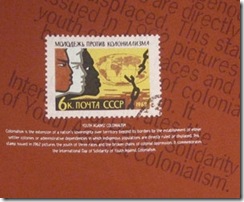Colonialism is the extension of a nation's sovereignty over territory beyond its borders by the establishment of either settler colonies or administrative dependencies in which indigenous populations are directly ruled or displaced.
 I was moved by both the meaning and the irony of this stamp depiction and therefore chose it for one of our t-shirt designs. The Soviet Union has been a poster child for colonialism. Yet, this stamp issued in 1962 pictures the youth of three races and the broken chains of colonial oppression. It commemorates the International Day of Solidarity of Youth Against Colonialism.
I was moved by both the meaning and the irony of this stamp depiction and therefore chose it for one of our t-shirt designs. The Soviet Union has been a poster child for colonialism. Yet, this stamp issued in 1962 pictures the youth of three races and the broken chains of colonial oppression. It commemorates the International Day of Solidarity of Youth Against Colonialism.
Moscow considered Eastern Europe to be a buffer zone for the forward defense of its western borders and ensured its control of the region by transforming the East European countries into satellite states. Soviet troops intervened in the 1956 Hungarian Revolution and cited the Brezhnev Doctrine, the Soviet counterpart to the U.S. Johnson Doctrine and later Nixon Doctrine, and helped oust the Czechoslovak government in 1968, sometimes referred to as the  Prague Spring. To further its influence, the Soviet Union concluded friendship and cooperation treaties with a number of states in the non-Communist world, especially among Third World and Non-Aligned Movement states like India and Egypt. Moscow advanced state interests by gaining military footholds in strategically important areas throughout the Third World. The Soviet Union provided military aid for revolutionary movements in the Third World. For all these reasons, Soviet foreign policy was of major importance to the non-Communist world and helped determine the tenor of international relations.
Prague Spring. To further its influence, the Soviet Union concluded friendship and cooperation treaties with a number of states in the non-Communist world, especially among Third World and Non-Aligned Movement states like India and Egypt. Moscow advanced state interests by gaining military footholds in strategically important areas throughout the Third World. The Soviet Union provided military aid for revolutionary movements in the Third World. For all these reasons, Soviet foreign policy was of major importance to the non-Communist world and helped determine the tenor of international relations.
Russia continues to exert influence as seen currently in the Middle East. Playing an active political, economic, military, and cultural role in the Middle East, the Russia has sought to undermine Western power there, with a view both to reducing the strategic threat to the U.S.S.R. from Iran, Turkey, and the Mediterranean and to increasing Soviet influence in world councils. Currently Russia attempts to balance a strategy of endorsing watered-down UN resolutions while deepening its relations with Iran in its continued efforts to project influence in the region.

